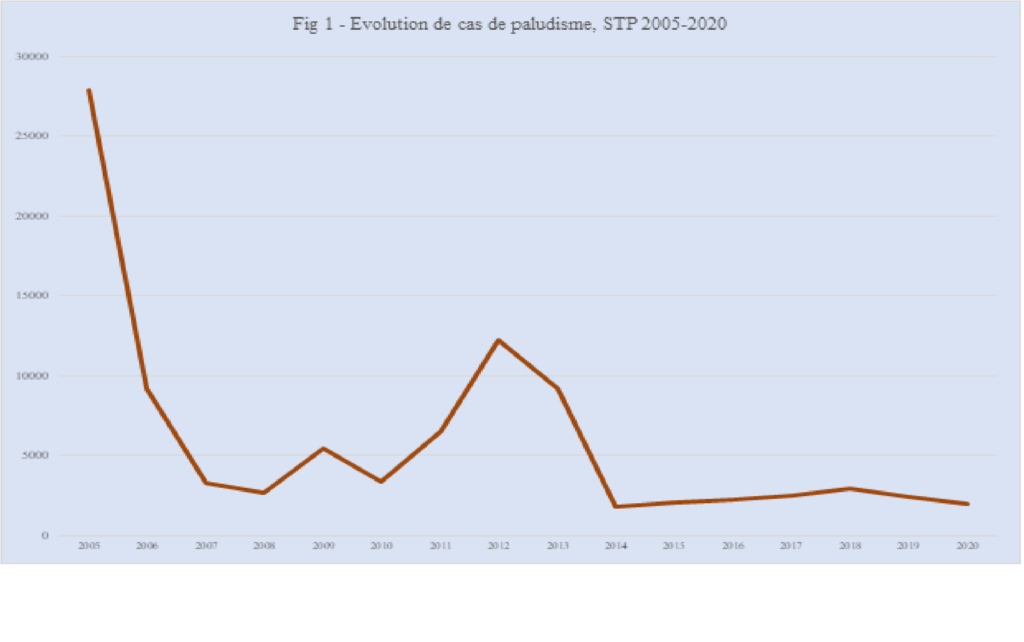Sao Tome and Principe’s Ministry of Health Principal Recipient for the first time
- November 30, 2021
- Article
- By Armelle Nyobe
- Read in French

The Democratic Republic of São Tomé and Príncipe (STP), located in West Africa, is made up of two main islands namely; São Tomé and Príncipe.
According to World Bank data in 2020, the total population is 219,161, while the female population represents 50.9% of the total population. About 32.1% of the population lives in rural areas while 67.9% in urban areas. The population of STP is predominantly young, with a 2% growth rate in 2019. The proportion of children under 5 years of age is 12.1%. The 5-14 age group accounts for 25.5%, the 15-64 age group for 59.2% and 3.2% are over 65 years of age.
STP’s economy, like that of other Small Island Developing States (SIDS), is heavily shaped by insularity, fragility, limited resources and low absorptive capacity, as well as poor governance, inability to provide basic services to the population and lack of adequate infrastructure. Economic growth has been spurred by an unsustainable dependence on public spending, especially public investment funded by grants or loans. The annual GDP growth rate dropped from 4.4% in 2011 to 2.7% in 2018. Public investment peaked at 31.5% of GDP in 2011 before sharply declining to 9% in 2018. The country is currently ranked by the United Nations Development Programme (UNDP) at position 137 out of 187 countries on the Human Development Index. In terms of corruption, the 2020 Corruption Perceptions Index (Transparency International) ranks the country 63rd out of 180 countries.
Considering these weaknesses and the high poverty rate of 66%, STP continues to benefit from substantial external assistance, both multilateral (World Bank, AfDB, EU, IMF, UN agencies) and bilateral (Portugal, Brazil, China, Nigeria). However, the social situation in STP remains quite alarming with respect to certain human development indicators, such as the objective of eradicating extreme poverty and hunger.
From 2005 onwards, STP received support from the Global Fund, the main donor for Malaria, 2006 for AIDS and 2007 for TB, thanks to a unique partnership-based funding model that produced a positive impact.
These grants have enabled the country to achieve good results in the fight against malaria and it is considered to be on track to eradicate malaria by 2025.

In 2005 the country recorded 27,945 cases of malaria. The graph above shows malaria trends from 2005 to 2020.
With regard to HIV/AIDS, STP is currently experiencing a mild but concentrated epidemic, with a declining trend, according to data on new infections (0.6%) recorded in 2013 (UNAIDS 2014 Report).
Between 2008 and 2014, the prevalence of this disease decreased in the 15-24 and 15-49 age groups, from 1.5% (IDS 2009) to 0.5% (MICS 2014) in the first group and from 0.8% to 0.1% in the second group.
HIV prevalence varies depending on location, with urban areas having the lowest rate at 0.3% and rural areas the highest at 0.8%. The disease burden of the HIV infection is unevenly distributed in the country. In the north, it is at 0.6%, south 0.4%, centre 0.3% and in the autonomous region of Príncipe 1.7% (MICS 2014).
Tuberculosis remains a serious national public health issue with an incidence rate of 124/100,000 population in 2019 (mainly affecting adults, youths and people living with HIV/AIDS) (WHO, 2019). The emergence of resistant TB (MDR-TB) cases worsens the situation, and is an additional burden on the health system, thereby highlighting the need for strengthening the system of detection and adequate treatment of cases.
In addition, this funding helped to increase decentralisation and integration of TB and HIV-related activities, with the introduction of GeneXpert and viral load testing, which resulted in improved diagnosis and follow-up of patients. The focus on treatment supported by Community Health Workers (CHWs) and a focus on Key Populations (KPs) has improved many indicators towards the main goal of eliminating TB and HIV/AIDS by 2035.
From 2005 to 2020, the Global Fund’s principal recipient was UNDP, with a management team established specifically for this purpose.
This decision was made because, as we know, the priority for Global Fund financing is to have one or more national entities or institutions as principal recipients. However, to do so, one of the two following requirements must be met: the country must not be in a state of conflict or the country must have the necessary fiduciary capacity to ensure the management of Global Fund funds. Additionally, where the country is in a state of conflict or the country does not have the fiduciary capacity to manage Global Fund funds, UNDP or other UN agencies are called upon to manage Global Fund grants until these requirements are fulfilled.
In the case of São Tomé and Príncipe, a rather peaceful and conflict-free country, assessments in 2004 showed that the country did not have national entities or institutions with the capacities and skills to effectively manage Global Fund grants. For this reason, UNDP was asked to become a Principal Recipient from 2005, with the mission of strengthening national capacity so that in the future it could become a Principal Recipient and be able to manage Global Fund financing transparently.
At the beginning of 2020, by decision of the Global Fund, the Ministry of Health was designated to manage Global Fund funds, for the STP-Z-MOH grant during the 2021-2023 period.
For the management of these funds, the Governments of São Tomé and Príncipe through the Ministry of Health created the Grants Management Unit (GMU), by Decree No. 21/2020.
In the performance of its work, the GMU is governed by national laws, and must also observe the principles, business models, rules and procedures specific to project funding agreement situations, including those of the Global Fund (GF), the International Alliance for Vaccination and Immunization(GAVI), the United Nations Population Fund (UNFPA) and other international funding agencies, specialized international organisations or funding entities with respect to administrative and financial matters, bidding , monitoring, evaluation and contract management.
Under this Global Fund grant, São Tomé and Príncipe has received approximately €11.6 million to fund programs for the fight against Malaria, HIV-AIDS and Tuberculosis and to strengthen the health system, for the 2021-2023period, with the Ministry of Health as the Principal Recipient. This is the first time São Tomé and Príncipe (Ministry of Health) is taking on the responsibility of Principal Recipient of the Global Fund.
On the other hand, the State of São Tomé has pledged to contribute approximately one million Euros as agreed, therefore, it is important to involve all the actors concerned and national entities directly or indirectly involved in this process of fighting the above-mentioned diseases, in a sustainable development perspective.
The government must make every effort to fulfil this commitment, and any failure by Sao Tome and Principe to do so may be detrimental in terms of feasibility and efficiency.
The public sector and national NGOs are involved in the management of this grant as Sub-recipients, namely:
- Public Institutions
- NFM-National Fund for Medicines
- NACP-National AIDS Control Programme/National TB Control Programme
- HSS – Health System Strengthening
- INPG-National Institute for the Promotion of Equity and Gender Equality
B. National NGOs
- Zatona Adil
- ASPF – Santomean Association for Family Planning
- Red Cross
As the Ministry of Health is the Principal Recipient, one of the immediate financial gains is that the management fee that was allocated to UNDP is now transferred to grant-related activities. On the other hand, this demonstrates that national entities already have the capacity and skills to manage grants from the Global Fund and other international partners, including the ability to build partnerships with bilateral and multilateral partners.
Earlier this year, for example, a memorandum of understanding was signed between the Ministry of Health, as the principal recipient, and UNDP. This MoU includes activities for the construction of a warehouse, various upgrades, acquisition of computer equipment, the purchase of vehicles and motorbikes, as well as the provision of technical assistance in areas within the mandate of UNDP which is an Implementing Agency for certain activities through an MoU signed with the Ministry of Health.
A process of drafting (in its final stages) a Memorandum of Understanding between the Ministry of Health, the Principal Recipient, and WHO, which will be responsible for the implementing technical assistance in technical areas related to AIDS, TB and Malaria and health system strengthening, is also underway.
As part of the MoU with UNDP, a technical advisor has been selected to support the GMU.
The organization chart of the GMU provides for the positions of two internal auditors, executives of the General Inspectorate of Finance, who alternately commit 20% of their time to the ongoing STP-Z-MOH grant. This is the alternative found because the country does not have a fiscal agent.
Concurrently, a local Fund Agent has been recruited by the Global Fund to monitor and check expenditures under the STP-Z-MOH grant, while taking into account restrictions on international travel due to the COVID-19 pandemic.
The information system is being implemented with funding from the Global Fund DHIS2 and MSupply.
With regard to the management of procurement, for the acquisition of health products and equipment, the GMU uses the Wambo platform, which has proven to be very efficient. However, in the context of COVID-19, and because STP is an island country, there are numerous difficulties with the freight and transport process, both by air and sea, which contribute to successive delays in the receipt of these health products, as well as risks of stock-outs. A quantification committee has been created and validated, and is awaiting an appointment decree from the senior officials.
Idalecio Aguiar


